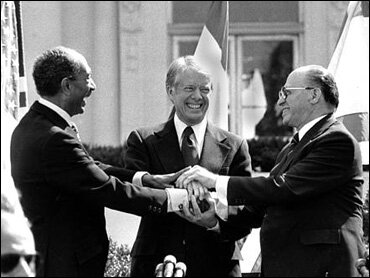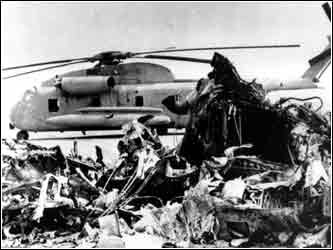No Prize for Jimmy
Editors Note: This is an update of the article that originally appeared here in October 2002. Why? Because Carter is the “undead” of American politics, taking the stage at the most inauspicious moments. Besides, most of us at the Razor actually lived through the disasterous four years of his presidency.
President Jimmy Carter has always had rotten luck. So it comes as no surprise that four days after the Nobel Committee announced that he would be the 2002 recipient for the Nobel Peace Prize, North Korea announced that it had cheated on an agreement – one which had been negotiated by the former president. Since that announcement, North Korea has removed seals on cameras installed by the United Nations, kicked out UN arms inspectors, and is pretty much attempting to blackmail East Asia with nuclear weapons.
President Carter’s supporters have countered his critics by stating that the president always takes the “high road”, sees the “big picture” or has a “global perspective” of events – implying that the critics are warmongering provincialists who lack the ability to care about anyone not of their class or nationality. There is an American tendency to look with nostalgia upon the administrations of past presidents, but even looking past the domestic failures of the well-traveled President, are his foreign policy successes deserving of the Nobel Prize?

No Prize for Jimmy
President Carter’s crowning achievement was the Camp David Accords which returned the Sinai to Egypt in exchange for the end of a state of war between Israel and Egypt. While the accords ended a shooting war between the two countries, it is worth noting that the agreement was not even negotiated by the Americans – most of the diplomacy having been done by the King of Morocco and the Ceausescu regime in Rumania. Washington DC was simply the money to fund the deal.
It is also worth noting that the resulting situation between them could not be viewed as peace – or even a “Cold Peace” as the state of affairs has been referred to by others. Egyptian authorities continue to support Palestinian terrorists. The Israeli army regularly finds tunnels into Gaza from the Sinai that are used to smuggle weapons and bomb making materials. The Egyptian press is filled with the most vile anti-Semitic propaganda seen since Heinrich Himmler. Egypt is also a hotbed for anti-American militancy, with the government unable to crack down on all but the worst excesses for fear that it will be overthrown by Islamic radicals. At the same time the government supports the terrorist operations by the likes Islamic Jihad and Hamas within the “Occupied Territories” and Israel proper. While Egypt may not be responsible for bombing Tel Aviv from fixed wing aircraft in a conventional war, it has bombed that city through its direct support of terrorism – achieving the same goal and in the eyes of all but the most hard-core moral relativists, taking the same responsibility. In effect, Carter’s true achievement was to shift Egyptian attacks from direct conventional military strikes to direct support of unconventional attacks – a legacy which Israel still grapples with today.
President Carter has never met a dictator he didn’t like. He negotiated with the military junta in Haiti even while human rights groups condemned them. Not that his negotiation led to anything; Haiti remains today what it has remained throughout the post-colonial period – a Caribbean backwater run by military strong men conveniently ignored by the United States. He has run missions to Cuba and Ethiopia as well, providing muted criticism of regimes in exchange for their use of him to legitimize themselves and thwart the efforts of the American administration of the time to isolate or overthrow them.
He has been a self-deluded pawn for dictators, and now by the anti-American European left wing. As Gunmar Berge, chairman of the Nobel committee stated, Carter’s “prize must be considered as a criticism of the present US administration,” – implying that without Bush’s hawkish stance towards Iraq, Carter wouldn’t have joined the ranks of more deserving winners such as the Red Cross, Ann San Suu Kyi, and the Dali Lama. Instead he joins the ignomonious ranks of such “men of peace” as Chairman Yassir Arafat, Henry Kissinger and Le Duc Tho. It is interesting to note that Le Duc Tho refused his share of the Nobel Prize in 1973, stating “peace had not been established” in Vietnam – a lesson apparently missed by the limelight-thriving Carter.
Carter’s refusal to believe that the North Koreans would not be negotiating in good faith has shown that the President is far from globalist: he is naive. Now the current administration must redouble its efforts to prevent “North Korea becoming a nuclear Kmart, complete with blue-light specials,” says Jon Wolfsthal, a nuclear proliferation expert at the Carnegie Endowment for International Peace. At the same time the administration must contain terrorism both within the US and abroad, fight a diplomatic and possibly shooting war with Iraq, as well as handle an economy currently in a bad part of the business cycle and corporate malfeasance not seen on such a scale since the 1930s.

When Carter took office in 1977, he received a moderately growing economy in which inflation was 5.4 percent and interest rates were around 8 percent. When he left office, the Soviets were entrenched in Afghanistan, Iranian students had been holding US State Department personnel and US Marines hostage for 444 days, the American military had been gutted by the administration’s post-Vietnam cutbacks, American prestige was in tatters abroad and inflation was in the double digits and interest rates were so high it was impossible for Americans to finance large purchases like homes and cars. Carter’s administration is without a doubt the worst in modern American history, yet Carter himself blamed his failures on a “national malaise”. This “malaise” kept his Democratic party out of power for 12 years; even today it wrestles to free itself from Carter’s legacy.
Jimmy Carter was a failure within the United States and the admission of North Korea only shows once again that he is a failure abroad as well. A Nobel Prize will never obscure these facts.

If only the following were true…
***
CARTER RETURNS NOBEL PEACE PRIZE
By Michael Kelly
WASHINGTON POST WRITERS GROUP
CARTER RETURNS NOBEL PEACE PRIZE
‘Too, Too Ridiculous,’ Ex-Prez Says
PLAINS, Ga., March 17 — In a move that stunned veteran narcissistic personality disorder observers, a smiling Jimmy Carter today announced that he had decided to return the coveted Peace Prize awarded to him last year by the Nobel Committee.
“I may be the most vainglorious, self-regarding, preachifying old coot since Henry Ward Beecher, but even I know when a joke has gone too far,” said Carter. “Let’s consider my contributions to world peace. In 1991, as the United States was on the very verge of war, I secretly lobbied the presidents of the United Nations Security Council nations, and also the heads of the Arab nations, to try to persuade them to scuttle my own country’s efforts to build a coalition and defeat Iraq. Imagine if I had succeeded — why, we now know Iraq was within months of building its first nuclear weapon when the war began!
“Then, I butted into Clinton’s disaster in Somalia, to put together the surrender to that charmer Mohamed Farah Aideed after his boys killed 18 of our soldiers and dragged their beaten bodies through the streets. And we now know that the spectacle of the Great Satan knuckling under to a guy whose entire army consisted of 10 second-hand Jeeps directly encouraged Osama bin Laden to believe that America was ripe for capitulation on a much greater scale — if you killed enough Americans.
“And the clincher — Korea. Yep, I’m the boy who free-lanced the 1994 agreement with the head-case of that horror show to stop his nuclear bomb program, in exchange for a whole bunch of aid from us. When reporters asked me then if it was really reasonable to expect Kim Il Sung to keep his word, given that he never had before, I said: ‘This is something that’s not for me to judge.’ Well, of course, neither that nut-job nor his nut-job son honored the deal for one second. So, now, eight years later, another American president has inherited another fine mess I got us in.”
“Please, take it back, and stop me before I negotiate again.”
***
References:
Jay Nordlinger, “Carterpalooza!, Jimmy Carter, our “model ex-president“, National Review
John O’ Sullivan, “Moments of Clarity – What North Korea Teaches Us”, National Review

The Razor » Blog Archive » The Razor Celebrates 13 Years:
[...] 2002 – October 2, 2002 – No Prize For Jimmy [...]
7 October 2014, 10:27 am